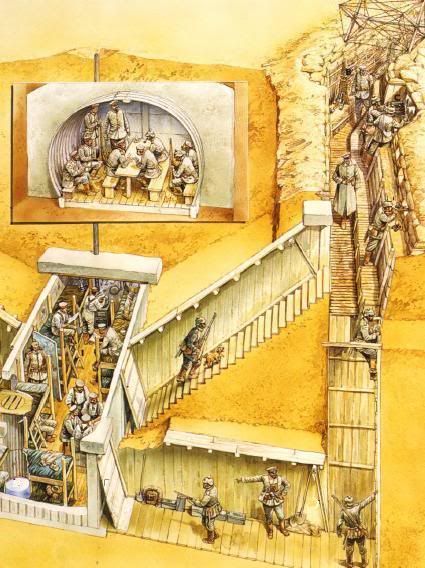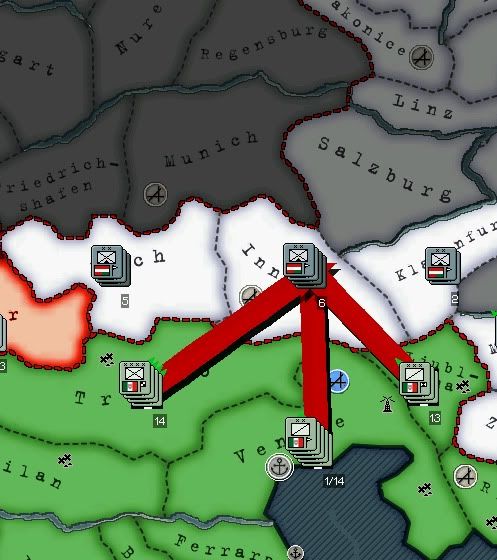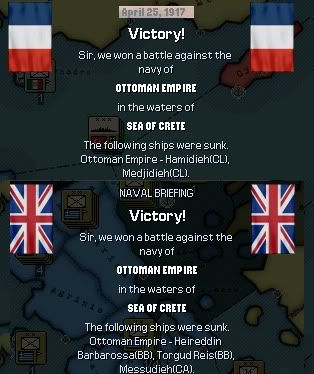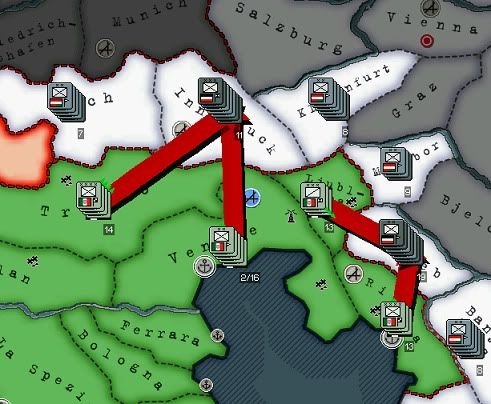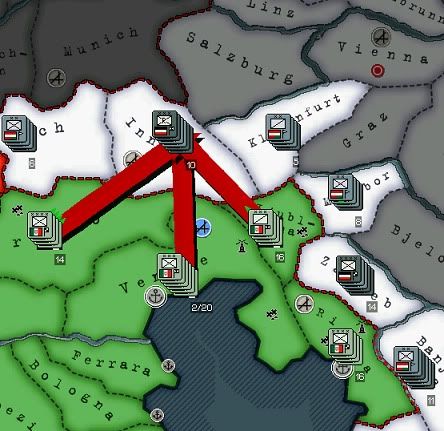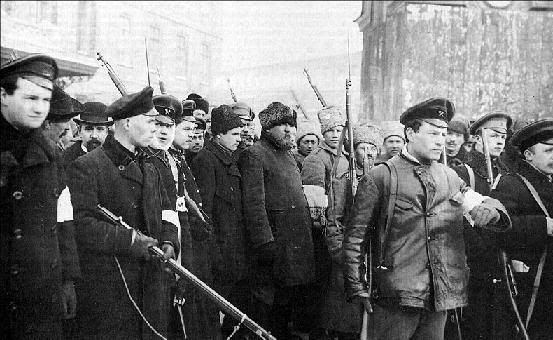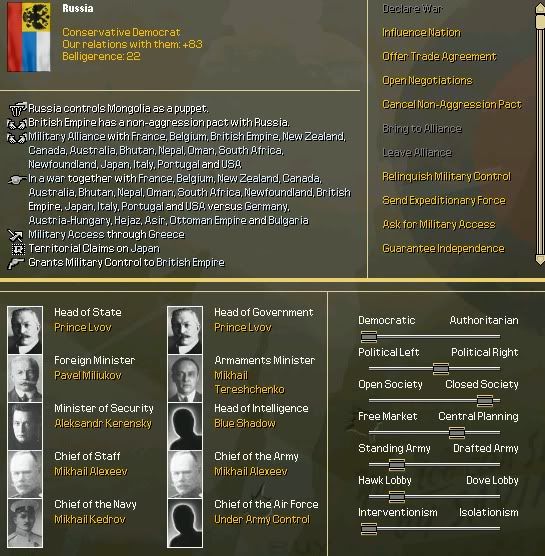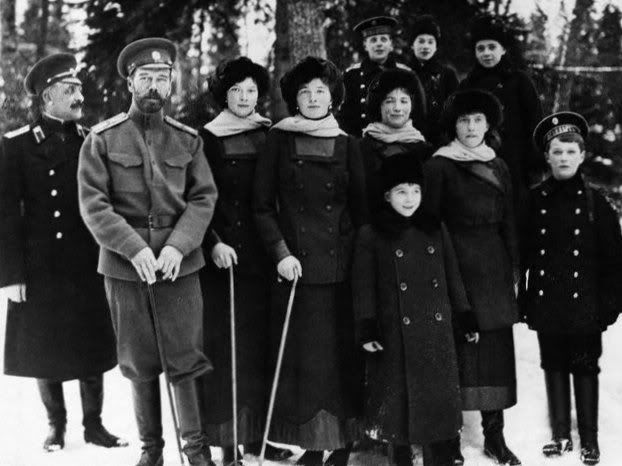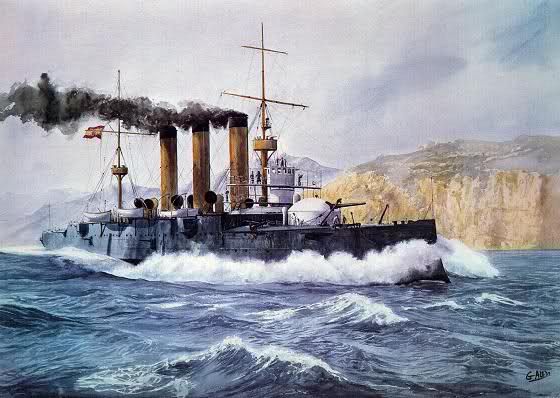Chapter fifty-nine: Many Wars Away...
As a part of the Allied cooperation effort, Cadorna released the bulk of the Italian army against the Austrian frontline in the Carnic Alps area. It began with the Fifth Battle of the Alps (9-17 April 1917). In spite of using artillery barrage and smoke, the forty-one Italian divisions were unable to advance against the determined but outnumbered Austro-German defenders. Even a diversive action against Mt. Matajur, in the Julian Alps, on the border between Slovenia and Italy, where an Oberleutnant Erwin Rommel defended the mountain with 100 men against 7,000 Italians, became another failure.All in all, the Italian offensive ended with small advances and many casualties in both sides (65,000 Italians casualties -17,000 dead, 48,000 wounded- vs 35,000 Austro-Germans -3,000 dead, 23,000 wounded-).
Not even the annhilation of most of the Austro-Hungarian fleet at the hands of the Royal Navy could cheer up Rome. After his important victory over the German fleet, Jellicoe was sent to the Mediterranean sea to reinforce the Allied naval forces there, that were being harrassed by the Austro-Hungarian navy. Even with the addition of the Italian fleet, the Allied forces were unable to stop the Austrian raids. Thus, where the Mediterranean Fleet failed, Jellicoe's dreadnoughts prevailed. Using the blockade of the Otranto Straits to channel the enemy sortie, the Grand Fleet patrolled the area with the hope that the admiral Miklós Horthy would leed his forces into another foray agaisnt the blockading force. And then, on April 18, the Austrian fleet sailed to its doom. In exchange for the old battleship
HMS Monarch and the virtual annhilation of two complete destroyer flotillas, Jellicoe managed to sink five Austrian battleships -one of them, Horthy's flagship, the
Tegetthoff-, a heavy cruiser and two destroyer flotillas. After this, the navy of the Dual Monarchy would never leave its bases at Pola and Cattaro again (1). Two days later, the pitiful Turkish navy -two outdated battleships, a defence coast ship and two light cruisers- were decimated by the French fleet of the Mediterranean Sea when the Ottoman ships attempted to intercept a convoy which transported Gallieni's Middle East Expeditionary Force to Syria. The French fleet just brushed aside the enemy fleet, sinking the two cruisers and heavily damaging the remanining ships, which were finished by Jellicoe's two days later.
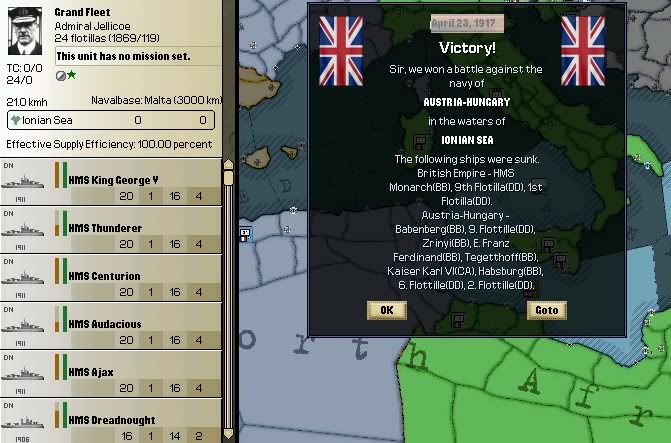
Unwilling to admit defeat, Cadorna resumed the offensive, attacking again in the Carnic Alps area (Sixth Battle of the Alps, 6–17 August 1917) and restarting the struggle to the west of the Isonzo river (Fourth Battle of the Isonzo, 6–14 August 1917). In Slovenia, after fierce and deadly fightings, the Italian Second Army, led by General Capello, pushed back Boroevic's Isonzo Armee to the Posavsko Hills, where the Austro-Hungarians finally stopped the enemy onslaught. On the north, however, all the Italian attacks failed in front of the strong defences of the Hohe Tauern mountain range, and the Italian units had to withdraw to their starting point. After the battle, the Austro-Hungarians were exhausted, and could not have withstood another attack. Fortunately for them (and unfortunately for their opponents), so were the Italians, who could not find the resources necessary for another assault, even though it might have been the decisive one. So the final result of the battle was an inconclusive bloodbath
(117,000 Italians casualties -30,000 dead, 87,000 wounded- vs 83,000 Austrians -8,000 dead, 65,000 wounded, 10,000 taken prisoner). Moreover, the end of the battle left a dangerous salient between the lines of the Italian Second and Third Army in the area of the Bela krajina (Weißkrain, White Carniola). With morale in the Italian army plunging Cadorna planned one further breakthrough attempt as he massed the greatest number of divisions and artillery yet along the Hohe Tauern range. Accordingly the Seventh Battle of the Alps was initiated some two weeks later on 20 August 1917 (2).
Cadorna amassed 50 divisions and as many guns as he could must, practically depriving the Third Army at Rijeka of its artillery, and stormed again the enemy lines (Seventh Battle of the Alps, 20 August - 8 September 1917). This time Cadorna changed his tactics. Instead of concentrating his forces in shorts attacks renewed time and time again, he began a continuous onslaught with a third of his divisions, another third in close reserve and the remaning third at striking distance of the front. Thus, as soon as the Austrian forces began to exhaust themselves in the fight, he released the second reserve and moved the remainig third to be ready to follow the success. Initially success emerged at once, and in two weeks the Itallian army advanced to within 50 kms of Lienz, although subsidiary attacks elsewhere failed. Nevertheless, a major Austro-Hungarian counter-offensive launched on 3 September reclaimed virtually all lost ground and by the time the battle was called off by Cadorna on 8 September little territory had been gained.
Casualties continued to be high: 96,000 Italian losses were sustained, with a further 56,000 Austro-Hungarian casualties. With the Austro-Hungarian front in danger of collapsing, von Hindenburg and Ludendorff send reinforcements to the area to launch a combined operation. Cadorna began to received reports of German activity and, therefore, he called off further attacks, preferring instead to adopt a defensive posture (3).
(1) Somewhere in the Adriatic are the
Goeben and the
Seydlitz. I know they are there because after the war was over they returned back home, but not because they ever met my fleet in the whole war.
(2) In OTL, the 11th battle of the Isonzo began on 19th August 1917. Had I knew how history was to repeat HoIstically itself...
(3) The Alps front is amazingly excruciating to attack. You're dried white trying to break through the enemy front and, when you manage to do it, the enemy counterattacks and sends you reeling back to your starting position. And be thankeful not too have a whole in your lines where the enemy is going to walk down the mountains to kick some Italian bottoms while whistling happily "An der schönen blauen Donau".
@Agent Larkin: I admit that the Japanese planes flying CAS over France are almost as striking as the Japanese Expeditionary Force in Iraq fighting, side by side, with the MEF. But the only one... Thank God that Nathan spotted it

@trekaddict: Indeed. I just regret not to have enough words devoted to that glorious action -it cuold have made a sharp contrast with the Somme...
@quaaz :rofl: Now you mention it, it's true!
@Nathan Madien: And then they say I'm slightly francoteaser...

@TheExecuter: Apparently, the idea was to give that "weapon" to the assault parties to cut the wire, IIRC. But, agreed, it was quite silly.
@Enewald: That's, definetively, ASB (I mean Alien space bats, neither the American School of Barcelona nor the Aarhus School of Business nor the American Society of Biomechanics nor the Artistic Society of Bulliers).

@Faeelin: Run away, it's a trap!
@trekaddict -2-: And no big moustached fellows? That's odd

@Enewald -2-: Americans are different, you know. Had they been Saudies or Japanese bussiness men...
@StephenT: Apprently, they had lost their direction and were searching for a way to return to France

@Enewald -3 :rofl: In the name of the Kaiser, of the Kaiserin and of Peti von Nebel, I award thee, Enewald von Enewalden, with the Order of the PetiPizzen, Erste Klasse, mit Lattichen und Gurken. Prossit!
@TheExecuter -2- Too right. And I would add Marengo, Austerlitz, Jena,... and Bailén. (Sorry, I'm a bitch)

@Enewald -4-: And I thought I liked to tease the French...
@TheExecuter -2-: No, it's a quite widespread malady, methinks.
@trekaddict -3-: Something like that.
@TheExecuter -3-: Of course, we all like to tease the French. And you know the British. They prefer to make praise of an enemy and to diminish themselves... False modesty, I would think.
In this AAR I hope that I've proved that the French army is as badly led as the British one -or the German, but I haven't got too deep-. And Let's not mention Cadorna... If there's a Passchendaele, you'll see that Nivelle wasn't the only fool at hand. The First day of the Somme proves that.
Fayolle... soon, very soon. Along with Humbert and Debeney, don't be afraid.
@MastahCheef:

